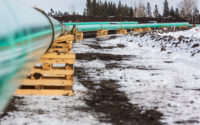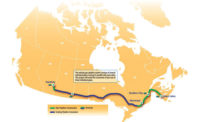On the heels of a major federal court victory, Canada’s multibillion-dollar Trans Mountain pipeline expansion project has been hit with a more than 70% cost hike that has raised questions about its viability.
Trans Mountain Corp., the federal corporation that manages the project since its 2018 acquisition, announced on Feb. 7 that the pricetag for the long-delayed project has jumped to $9.5 billion, up from $5.6 billion previously.
It includes a total of $6.3 billion in construction and $1.3 billion in finance carrying costs, as well as a $375 million contingency fund for cost impacts "beyond the control of Trans Mountain,” the company said, with reports pointing to higher right-of-way and labor costs,
Canadian Finance Minister Bill Morneau also noted design changes, such as thicker pipe in some areas and better leak-detection equipment.
The project, set to be in service by December 2022, would extend from Edmonton, Alberta to a terminal near Vancouver, B.C., adding 600 miles and triple current capacity to 890,000 barrels per day of oil and refined products that Canada hopes to sell to Asian markets.
Tribes Weigh In
The price shock comes on the heels of Canada’s Federal Court of Appeal decision rejecting environmental challenges from First Nations groups that live in the territory through which the pipeline is slated to be built.
The federal court, which ruled against the government in 2018 for not adequately consulting with the tribes, noted apparent improvements to the consultation process since the last decision. The federal court ruling is the last major legal and regulatory hurdle for the project, which was first approved by the federal government in 2016 but has been hit with costly delays amid fierce opposition.
Unable to handle the hurdles to continue on with the project, Houston-based Kinder Morgan sold the pipelineto the Canadian government in 2018 for $3.4 billion.
“The evidentiary record shows a genuine effort in ascertaining and taking into account the key concerns of the applicants, considering them, engaging in two-way communication,” Canada’s Federal Court of Appeal ruled. “Contrary to what the applicants assert, this was anything but a rubber-stamping exercise.”
The Sqaumish Nation, a major project opponent, vowed to appeal the decision to the Supreme Court of Canada, arguing the project “continues to be a threat to our coastline and community in the case of a pipeline leak or tanker spill.”
Meanwhile, opponents of the pipeline project vowed to continue the fight with protests and civil disobedience aimed at halting or disrupting work. A group called Tiny House warriors has been building small homes across the pipeline’s planning route in a bid to prevent it from encroaching on unceded indigenous territory.
Tsleil-Waututh Nation activist and pipeline opponent Will George, who has grabbed attention in the past by rappelling off a bridge in Vancouver to block an oil tanker and interrupting speeches by Prime Minister Justin Trudeau, has vowed to ramp up the pressure.
In a statement, Trans Mountain pointed to a British Columbia Supreme Court injunction that prohibits blocking of the pipeline’s work sites. “Trans Mountain respects the right to peaceful, lawful expressions of opinions,” the company said, noting the $375-million contingency fund designed to “accommodate for normal types of delays … such as access to sites being delayed as the result of some protest activity.”
Opposition Stirred Up?
The recent appeal court decision thrusting Trans Mountain back into the headlines also has stirred up public opposition to the project across Canada, according to one recent poll. While 55% of Canadians still support the project, opposition has shot up by 11 percentage points since 2018, according to a recent survey by the non-profit Angus Reid Institute.
More troubling for the Trudeau government, opposition has spiked by 18% in Quebec and 13% in Ontario, and in British Columbia's Liberal party strongholds. “It has reminded people who have been opposed to the project and who have forgotten about it that this thing exists,” said Shachi Kurl, institute executive directo.r
In a bid to defuse the tension, Finance Minister Morneau said on Feb. 10 that the federal government is launching a new round of talks with the 129 Indigenous tribes impacted by the project to explore how they might acquire an ownership stake in the pipeline and its expansion.
The big cost increase could also help shake public support on the project, with the Angus Reid Institute planning to poll Canadians on this issue.
The Canadian government has spent $1.8 billion on the project since buying it, with another $1.3 billion in financial carrying costs, and $6.3 billion in additional construction costs—with a final cost that could approach nearly $13 billion.
That could leave the government stuck holding the bag for a loss if and when it moves ahead with plans to sell the pipeline, some observers say.
But Reuters speculated on Feb. 10, based on an analyst's report, that Brookfield Infrastructure Partners LP could be a potential buyer.
“Not a single tax dollar should have been spent on the Trans Mountain expansion,” said Shannon Stubbs, a conservative MP from Alberta, at a news conference. “I think they should do monthly reports to Canadians on the progress and the cost of the Trans Mountain expansion.”






Post a comment to this article
Report Abusive Comment